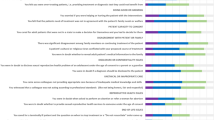Abstract
Clinicians may increasingly find themselves practicing, by choice or necessity, in resource-poor or extreme environments. This often requires altering typical patterns of practice with a different set of medical and ethical considerations than are usually faced by clinicians practicing in hospitals in the United States and Europe. Practitioners may be required to alter their usual scope of practice or their standard ways of medically treating patients. Limited resources will also often place clinicians in the position of having to make decisions about fairly allocating healthcare, which will alter the physician–patient relationship. This does not absolve physicians and other healthcare practitioners of providing the best quality of care that can be given under the circumstances. In addition, the lack of a well-developed healthcare infrastructure and limited resources will require working with established providers to determine the needs of the community, and what types of healthcare are feasible given these limitations. The essays in this issue of HEC Forum encourage readers to reflect on the unique ethical challenges faced in the extreme or austere environment.
Similar content being viewed by others
Notes
References
Allhoff, F., & Golemon, L. (2020). Rural bioethics: The Alaska context. HEC Forum, 32(4). https://doi.org/10.1007/s10730-019-09385-5.
Bailey, R. (2010). The case of Dr. Anna Pou: Physician liability in emergency situations. Virtual Mentor, 12(9), 726–730.
Battat, R., Seidman, G., Chadi, N., Chanda, M. Y., Nehme, J., Hulme, J., et al. (2010). Global health competencies and approaches in medical education: A literature review. BMC Medical Education, 10, 94.
Beauchamp, T. L., & Childress, J. F. (2013). Principles of biomedical ethics (7th ed.). New York: Oxford University Press.
Beckwith, F., & Thornton, A. K. (2020). Moral status and the architects of principlism. The Journal of Medicine and Philosophy, 45(4–5), 504–520.
Crump, J. A., & Sugarman, J. (2008). Ethical considerations for short-term experiences by trainees in global health. Journal of the American Medical Association, 300(12), 1456–1458.
DeCamp, M. (2011). Ethical review of global short-term medical volunteerism. HEC Forum, 23(1), 91–103.
Donelan, K., DesRoches, C. M., Dittus, R. S., & Buerhaus, P. (2013). Perspectives of physicians and nurse practitioners on primary care practice. New England Journal of Medicine, 368(20), 1898–1906.
Engelhardt, H. T., Jr. (1996). The foundations of bioethics (2nd ed.). New York: Oxford University Press.
Garcia, J. L. A. (2020). Virtues and principles in biomedical ethics. The Journal of Medicine and Philosophy, 45(4–5), 471–503.
Heinrichs, B. (2019). Myth or magic? Towards a revised theory of informed consent in medical research. The Journal of Medicine and Philosophy, 44(1), 33–49.
Iserson, K. V. (2020). Providing healthcare in resource-poor environments. HEC Forum 32(4). https://doi.org/10.1007/s10730-018-9346-7.
Klein, K. R., Pepe, P. E., Burkle, F. M., Nagel, N. E., & Swienton, R. E. (2008). Evolving need for alternative triage management in public health emergencies: A Hurricane Karina case study. Disaster Medicine and Public Health Preparedness, 2(suppl 1), S40–S44.
Langowski, M. K., & Iltis, A. (2011). Global health needs and the short-term medical volunteer: Ethical considerations. HEC Forum, 23(1), 71–78.
Mucker, D., & Taylor, J. S. (2020). The irrelevance of harm for a theory of disease. The Journal of Medicine and Philosophy, 45(3), 332–349.
O’Neil, E. O. (2006). The “ethical imperative” of global health service. Virtual Mentor, 8(12), 846–850.
Pingree, C. S., Newberry, T. R., McMains, K. C., & Holt, G. R. (2020). Medical ethics in extreme and austere environments. HEC Forum 32(4). https://doi.org/10.1007/s10730-020-09405-9.
Shea, M. (2020). Principlism’s balancing act: Why the principles of biomedical ethics need a theory of the good. The Journal of Medicine and Philosophy, 45(4–5), 441–470.
State Bar of Texas. (2014). Texas Pattern Jury Charges. Austin: State Bar of Texas.
Stokes, S., Koirala, P., Wallace, S., & Bhandari, S. (2015). Tragedy on Everest: The Khumbu icefall. Emergency Medicine Journal, 32(5), 418–420.
Stokes, S., Mackenzie, S., & Thomas, C. (2011). Medical ethics in mountain and wilderness medicine. BMJ Military Health, 157, 124–126.
Trotter, G. (2020). The authority of the common morality. The Journal of Medicine and Philosophy, 45(4–5), 427–440.
Veatch, R. (2020). Reconciling lists of principles in bioethics. The Journal of Medicine and Philosophy, 45(4–5), 540–559.
Walker, P., & Lovat, T. (2019). Dialogic consensus in medicine—A justification claim. The Journal of Medicine and Philosophy, 44(1), 71–84.
Wakefield, J. C., & Conrad, J. A. (2020). Harm as a necessary component of the concept of medical disorder: Reply to Mucker and Taylor. The Journal of Medicine and Philosophy, 45(3), 350–370.
Welling, D. R., Ryan, J. M., Burris, D. G., & Rich, N. M. (2010). Seven sins of humanitarian medicine. World Journal of Surgery, 34(3), 466–470.
World Health Organization (2018). Climate change and health. https://www.who.int/mediacentre/factsheets/fs266/en/
Zafren, K., Brants, A., Tabner, K., Nyberg, A., Pun, M., Basnyat, B., et al. (2018). Wilderness mass casualty incident (MCI): Rescue chain after avalanche at Everest base camp (EBC) in 2015. Wilderness & Environmental Medicine, 29(3), 401–410.
Zientek, D., & Bonnell, R. (2020). When international humanitarian or medical missions go wrong: An ethical analysis. HEC Forum 32(4). https://doi.org/10.1007/s10730-019-09392-6.
Author information
Authors and Affiliations
Corresponding author
Additional information
Publisher's Note
Springer Nature remains neutral with regard to jurisdictional claims in published maps and institutional affiliations.
Rights and permissions
About this article
Cite this article
Zientek, D. Healthcare in Extreme and Austere Environments: Responding to the Ethical Challenges. HEC Forum 32, 283–291 (2020). https://doi.org/10.1007/s10730-020-09427-3
Accepted:
Published:
Issue Date:
DOI: https://doi.org/10.1007/s10730-020-09427-3




